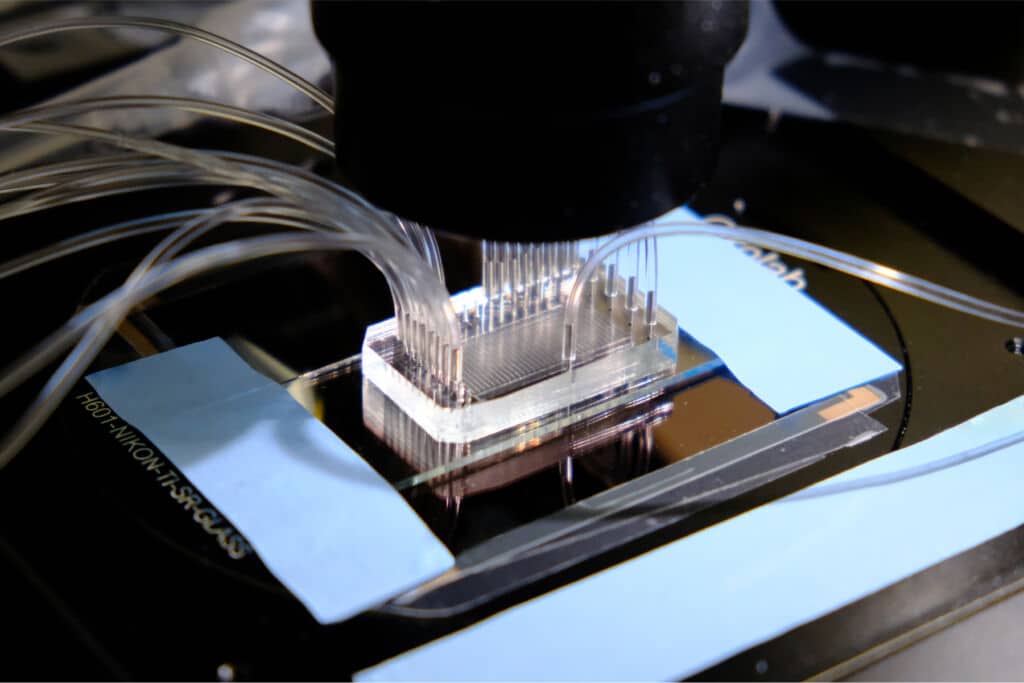Newsletter Signup - Under Article / In Page
"*" indicates required fields
AI tools like ChatGPT are revolutionizing how the world generates text, images and code. In a similar way, machine learning algorithms and generative AI are upending traditional processes in life sciences and collapsing time frames in drug discovery and materials development.
AlphaFold by DeepMind is probably the most well-known machine learning model in this space. It predicts the 3D structure of a protein from its amino acid sequence and has been used by more than 1 million researchers in 18 months. Since then, other AI tools have emerged, such as the recently open-sourced RFDiffusion, a machine learning model that allows researchers to generate computational protein designs using a laptop.
However, translating those computational designs into physical, functioning proteins remains challenging. Adaptyv Bio has been launched to address this with its protein foundry. Combining robotics, microfluidics and synthetic biology techniques, Adaptyv Bio is building a full-stack platform to allow protein engineers to validate their AI-generated protein designs.
Validating protein design
Julian Englert, CEO and co-founder at Adaptyv Bio, said: “Proteins are at the core of the biorevolution, whether in the form of new medicines, better enzymes for research and industrial applications or as materials with novel properties. As a protein designer you now have access to incredible new AI tools such as AlphaFold or RFDiffusion. But validating your protein designs in the lab to see if they work remains a huge pain.”
The thing that AI models need the most is data – for training them and for improving the predictions they make. By making it easier to generate data about how well the designed proteins work, Adaptyv Bio allows protein engineers and AI models to get more feedback about their designs and helps them steer towards better performing proteins.
“Think of the AI in a self-driving car. In order to keep the car on the road and drive it to the destination, the AI model needs to have a tight feedback loop by getting lots of high-quality data from the car’s camera sensors. It’s pretty much the same principle for an AI model designing new proteins, just that the feedback mechanism here is actually making the proteins in our lab and testing how they perform,” Englert added.
Adaptyv Bio work cells
At the heart of Adaptyv Bio’s foundry are protein engineering workcells — custom, automated setups that miniaturize processes usually requiring multiple laboratory machines, instead conducting them in parallel across small microfluidic chips. Users can write experimental protocols (or have AI write them for them) and the workcells then execute the experiments fully autonomously while controlling and tracking the experiments’ parameters. All measurement data is automatically processed and uploaded to allow users to improve their machine learning models with each experiment.
Englert said: ”Our workcells are fully automated, consume 1,000 times fewer reagents than any commercially available alternative, and we can run thousands of different proteins per day on each individual setup. To streamline the experimental workflows, we have developed a lot of custom synthetic biology and automation techniques. Over the next 12 months, we plan to scale up our lab further and increase the number of protein design applications we can support. We also just opened up early access for users to submit their protein design projects to us, and we’re trying to onboard new projects as soon as possible.”
In order to accelerate the field of protein engineering as a whole, Adaptyv Bio also open-sourced two of their internal tools, which have already started gaining traction among researchers and engineers in the field.
ProteinFlow is a Python library to allow protein designers to easily create high-quality datasets for better AI models. Automancer is an extensible software platform to run automated experiments, enabling researchers to build their own experimental protocols and integrate different laboratory instruments.
“Our mission is to make protein engineering easier and to enable more researchers to design new proteins. Take a look at the proteins that make up the incredibly powerful molecular machinery inside every single one of the cells in our body. Now imagine the kind of technological progress humanity could make if we could start designing novel proteins for personalized medicines, industrial applications like new enzymes, or better, more sustainable materials,” Englert concluded.
Adaptyv Bio was founded by a group of engineers from EPFL, the Swiss Federal Institute for Technology in Lausanne. In 2022, they raised $2.5 million in a pre-seed funding round led by Wingman Venture, after going through the Y Combinator startup accelerator.
The company is based at the newly built Biopole life science campus in Lausanne, Switzerland.
The power of AI in antibody discovery






